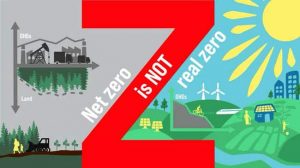As we’ve seen with people such as Greta Thunberg, it truly takes only one person to change the world. However, when it comes to the actual impact one individual can have on the world’s total carbon output, it’s relatively slim to none. Personally, it’s hard to feel like I am making a difference by properly separating my garbage, recycling, and compost. When we think of what the worst contributor to the current climate crises is, the most obvious answer is the multi-national oil and gas companies who even invested in marketing for climate change denial. In fact, 9% of the world’s total greenhouse gas emissions come directly from these companies and an additional 33% comes from end use of their goods (mostly in transportation). So, why not target the heaviest emitters instead?
The reality is that many oil and gas companies are already pushing to reduce their carbon output. Their stocks have been trailing the market average substantially since 2015 and increasing government restrictions globally means they need to change. Companies such as BP have pledged to become fully carbon neutral by 2050, whereas Shell wants to do the same for Scope 1 and 2 emissions, while reducing Scope 3 emissions by 65%. They do this by selling carbon-neutral LNG and oil cargo through offset investments and increasing their use of renewable energy for power. For example, the French company TotalEnergies recently sold a batch of carbon-neutral LNG in 2020 using investments in forest production in Zimbabwe and investing in wind power for coal plants in China. For now, this is all they can do until CCUS and direct air capture technologies are developed at scale, but is this even enough?
 The IPCC recently revealed that simply waiting for carbon removal technology is too risky and unsustainable. Secondly, although many companies report their offset spending, there is very little verification of the actual climate benefits these projects entail, as there is no standardized or regulated way to truly do so. Lastly, it’s sometimes hard to believe these company’s promises. For example, the same day Shell announced their net zero ambition they also announced a $6.4 billion gas project in Australia set to operate for another 30 years once completed.
The IPCC recently revealed that simply waiting for carbon removal technology is too risky and unsustainable. Secondly, although many companies report their offset spending, there is very little verification of the actual climate benefits these projects entail, as there is no standardized or regulated way to truly do so. Lastly, it’s sometimes hard to believe these company’s promises. For example, the same day Shell announced their net zero ambition they also announced a $6.4 billion gas project in Australia set to operate for another 30 years once completed.
Whether giant oil and gas companies can become fully carbon neutral in any timeframe seems hard to believe and we may never know the actual successes of their offset investments.
Sources:
https://www.wsj.com/articles/big-energy-companies-new-pitch-carbon-neutral-oil-and-gas-11634032800
https://oilprice.com/Energy/Energy-General/Oil-And-Gas-Companies-Will-Never-Truly-Be-Carbon-Neutral.html
Which major oil companies have set net-zero emissions targets?
What Does Net Zero Emissions Mean for Big Oil? Not What You’d Think
https://www.mckinsey.com/industries/oil-and-gas/our-insights/the-future-is-now-how-oil-and-gas-companies-can-decarbonize
https://www.theguardian.com/environment/2021/jun/30/climate-crimes-oil-and-gas-environment